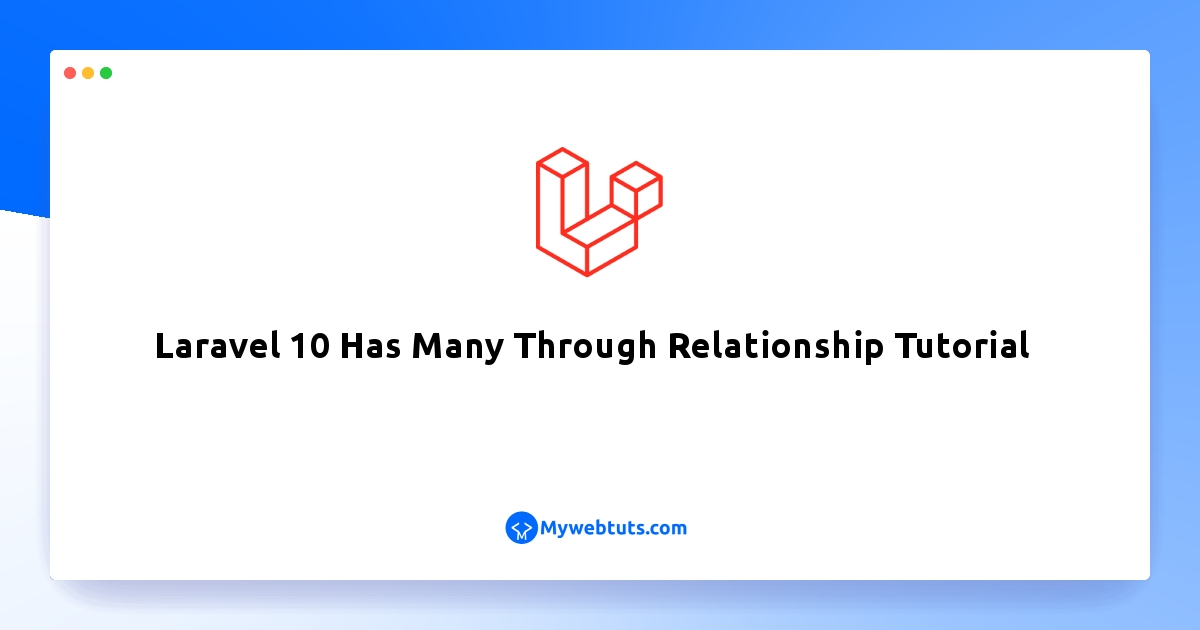Laravel 10 Has Many Through Relationship Tutorial
Mar 13, 2023 . Admin

Hi dev,
This extensive guide will teach you laravel 10 has many through relationship example. I explained simply step by step laravel 10 has many through pivot table. If you have a question about has_many through relationship laravel 10 then I will give a simple example with a solution. if you want to see an example of hasmanythrough laravel 10 inverse then you are in the right place. Here, Create a basic example of laravel 10 hasmany through relation.
So in this tutorial, you can understand how to create has many through relationships with migration with a foreign key schema for one to many relationships, create records, attach records, get all records, where condition and everything related to has many through relationship.
In this example, I will create "users", "posts" and "countries" tables. each table is connected with each other. now we will create many to many relationship with each other by using the laravel Eloquent Model. We will first create database migration, then models, retrieve records and then how to create records too. So you can also see the database table structure on the below screen.
Has Many Through Relationship will use "hasManyThrough()" for relation.
Create Migrations:Now we have to create migration of "users", "posts" and "countries" table. we will also add foreign key with users and posts table. so let's create like as below:
users table migration:
<?php
use Illuminate\Database\Migrations\Migration;
use Illuminate\Database\Schema\Blueprint;
use Illuminate\Support\Facades\Schema;
return new class extends Migration
{
/**
* Run the migrations.
*
* @return void
*/
public function up(): void
{
Schema::create('users', function (Blueprint $table) {
$table->id();
$table->string('name');
$table->string('email')->unique();
$table->timestamp('email_verified_at')->nullable();
$table->foreignId('country_id')->constrained('countries');
$table->string('password');
$table->rememberToken();
$table->timestamps();
});
}
/**
* Reverse the migrations.
*
* @return void
*/
public function down(): void
{
Schema::dropIfExists('users');
}
};
posts table migration:
<?php
use Illuminate\Database\Migrations\Migration;
use Illuminate\Database\Schema\Blueprint;
use Illuminate\Support\Facades\Schema;
return new class extends Migration
{
/**
* Run the migrations.
*
* @return void
*/
public function up(): void
{
Schema::create('posts', function (Blueprint $table) {
$table->increments('id');
$table->string("name");
$table->foreignId('user_id')->constrained('users');
$table->timestamps();
});
}
/**
* Reverse the migrations.
*
* @return void
*/
public function down(): void
{
Schema::dropIfExists('posts');
}
};
countries table migration:
<?php
use Illuminate\Database\Migrations\Migration;
use Illuminate\Database\Schema\Blueprint;
use Illuminate\Support\Facades\Schema;
return new class extends Migration
{
/**
* Run the migrations.
*
* @return void
*/
public function up(): void
{
Schema::create('countries', function (Blueprint $table) {
$table->increments('id');
$table->string('name');
$table->timestamps();
});
}
/**
* Reverse the migrations.
*
* @return void
*/
public function down(): void
{
Schema::dropIfExists('countries');
}
};
Create Models:
Here, we will create Country model. we will also use "hasManyThrough()" for relationship of both model.
Country Model:
<?php
namespace App\Models;
use Illuminate\Database\Eloquent\Factories\HasFactory;
use Illuminate\Database\Eloquent\Model;
class Country extends Model
{
use HasFactory;
/**
* Write code on Method
*
* @return response()
*/
public function posts()
{
return $this->hasManyThrough(
Post::class,
User::class,
'country_id', /* Foreign key on users table... */
'user_id', /* Foreign key on posts table... */
'id', /* Local key on countries table... */
'id' /* Local key on users table... */
);
}
}
Retrieve Records:
<?php
namespace App\Http\Controllers;
use Illuminate\Http\Request;
use App\Models\Country;
class UserController extends Controller
{
/**
* Write code on Method
*
* @return response()
*/
public function index(Request $request)
{
$country = Country::find(1);
dd($country->posts);
}
}
I hope you understand of one to one relationship...
